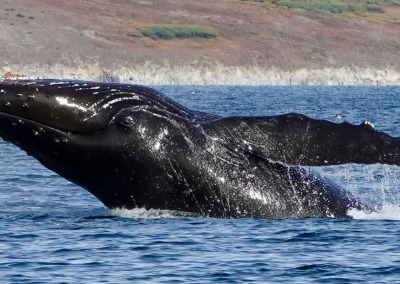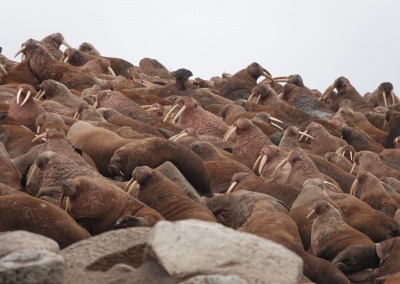Whale hunters
Most indigenous groups who live near coastal areas of Arctic Russia do the occasional bit of seal or walrus hunting. However, there are only two groups who live entirely by hunting whales and other sea mammals: the coastal Chukchi and the Siberian Yupik (Eskimos) of Chukotka’s Arctic Ocean and Bering Sea coasts These people, just like their ancestors, go out to sea in small boats to spear down their prey and drag it back to their village, where it is shared out among all inhabitants for free.
While the inland Chukchi are nomadic reindeer herders, the coastal Chukchi are sea mammal hunters, like their Yupik (Eskimo) neighbours. The inland Chukchi use reindeer-drawn sledges for transport, whereas the coastal Chukchi use dog sledges. Throughout history, there has always been a healthy trade (and a fair bit of warfare) between the coastal and inland Chukchi.
In coastal villages like Vankarem, Lorino and Novoye Chaplino whale meat is one of the main constituents of the diet. Near some villages you can find whale skeletons jutting out of the sand or mud at the water’s edge.
Although this way of life may seem a little brutal to a sensitive western mind, these communities do limit the number of whales they catch each year so as not to deplete the population. This is not an industry based on killing as many whales as possible: it is indigenous people living in harmony with nature as their ancestors always have, never taking more than they need to survive and allowing the whale population to flourish. There is no other way people in these communities could feed themselves, and whale hunting is presumably the reason people first settled in this area thousands of years ago.
The remains of villages and sacred sites built mainly of whale bones can still be found in many places along Chukotka’s coast and on its offshore islands. We offer one Chukotka itinerary focused on exploring the culture of the whale hunters both in its ancient and modern forms. Guests will get to visit these ancient sites, study several types of whales up close and take part in a traditional whale hunt. A side trip to inland reindeer-herding Chukchi is also included.
Most indigenous groups who live near coastal areas of Arctic Russia do the occasional bit of seal or walrus hunting. However, there are only two groups who live entirely by hunting whales and other sea mammals: the coastal Chukchi and the Siberian Yupik (Eskimos) of Chukotka’s Arctic Ocean and Bering Sea coasts These people, just like their ancestors, go out to sea in small boats to spear down their prey and drag it back to their village, where it is shared out among all inhabitants for free.
While the inland Chukchi are nomadic reindeer herders, the coastal Chukchi are sea mammal hunters, like their Yupik (Eskimo) neighbours. The inland Chukchi use reindeer-drawn sledges for transport, whereas the coastal Chukchi use dog sledges. Throughout history, there has always been a healthy trade (and a fair bit of warfare) between the coastal and inland Chukchi.
In coastal villages like Vankarem, Lorino and Novoye Chaplino whale meat is one of the main constituents of the diet. Near some villages you can find whale skeletons jutting out of the sand or mud at the water’s edge.
Although this way of life may seem a little brutal to a sensitive western mind, these communities do limit the number of whales they catch each year so as not to deplete the population. This is not an industry based on killing as many whales as possible: it is indigenous people living in harmony with nature as their ancestors always have, never taking more than they need to survive and allowing the whale population to flourish. There is no other way people in these communities could feed themselves, and whale hunting is presumably the reason people first settled in this area thousands of years ago.
The remains of villages and sacred sites built mainly of whale bones can still be found in many places along Chukotka’s coast and on its offshore islands. We offer one Chukotka itinerary focused on exploring the culture of the whale hunters both in its ancient and modern forms. Guests will get to visit these ancient sites, study several types of whales up close and take part in a traditional whale hunt. A side trip to inland reindeer-herding Chukchi is also included.


